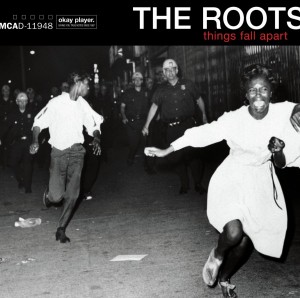
“Inevitably, hip-hop records are treated as though they are disposable. They are not maximized as product, not to mention as art,” concludes “Act Won,” the foreboding intro track from Things Fall Apart. It sets the stage for the brooding assault on mainstream industry and the self-referential rumination on Black culture that is The Roots’ seminal LP, which turned 15 years old Sunday.
Hip-hop was becoming disposable in its incipient stages of 21st-century commercialization, the band claims, but ironically, few albums in the last two decades have retained the replay value, topical relevance and critical acclaim of Things Fall Apart.
Things Fall Apart is the easiest Roots album to analyze in retrospect. It remains their most commercially successful, going gold in ’99 and reaching platinum certification last year. It was also the catalyst that launched The Roots from jazz-loving freestylers to a dense, eclectic, Afrocentric movement. Do You Want More?!!!??! and Illadelph Halflife were both breakouts — The Source rewarded the latter with 4.5 mics — but it’s only after Things Fall Apart that The Roots movement became a full aesthetic; a crew with b-boy sensibility and live instrumentation that could still adapt to the sociopolitical climate of a modern hip-hop era.
What’s most striking about the album is its stubborn dedication to the old school. Recording sessions took place at Manhattan’s Electric Lady Studios, at the same time as Afro-futuristic projects like Erykah Badu’s Mama’s Gun and D’Angelo’s Voodoo. Yet Things Fall Apart is rooted in back-and-forth emceeing, clanking boom-bap percussion and name-drops of a bevy of early 90s legends, from the Wild Style rendition on “Double Trouble” to shouts to Big Daddy Kane, Organized Konfusion and Hype Williams on consecutive songs. “Double Trouble” was originally supposed to feature both Mos Def and Talib Kweli, but Black Thought was insistent on throwing back to the lyrical double-team style of EPMD. Mighty Mos was the one to make the cut, and 15 years later, “Double Trouble” remains one of hip-hop’s most triumphant tongue-twisters. The same call-and-response rapping is seen between Thought and former Roots emcee Malik B on “Table of Contents.” While their technical skills evolved, The Roots had no intention of moving forward.
The fixation on hip-hop’s gentrification powers Things Fall Apart‘s underlying tense soundscape. The album’s title comes from Chinua Achebe’s novel of the same name, which details the plight of village leader Okonkwo in 1890s Nigeria. As his people slowly succumb to white settlers, Okonwko struggles to come to terms with relinquishing control. Tribal culture is grounded in pride and machismo, and losing that culture to outsiders proves to be too much: Okonkwo kills a white settler, then hangs himself as his execution is called for. Black Thought and Co. refuse to hew to the new standards of millennial hip-hop, and the result is a paranoid, lacerating effort of syllable cramming equivalent to Okonkwo’s last stand. “We at the brink of war / What does it all mean? What’s it all for? / With knowledge of self, then you’re through the next door,” Black Thought preaches on “Ain’t Sayin’ Nothin’ New.” “100% Dundee” is perhaps the album’s lyrical peak, but its message is simple: “represent The Fifth Dynasty / Lyrical click, 100% dundee.”
Things Fall Apart is just as memorable as one of the genre’s first modern struggle raps. Illadelph is likened to Vietnam, Black artists are portrayed as victims of commercial exploitation, and romance comes with limiting complications. “Act Too” features a continuation of Common’s “I Used To Love H.E.R.,” only in Black Thought’s verse, he thanks hip-hop for offering the only viable route out of the ghetto. “Adrenaline!” has Thought, Malik, Dice Raw and a rookie Beanie Sigel as volatile products of their environment. And unlike precursors like Eric B. and Rakim and Pete Rock and C.L. Smooth, The Roots are able to tell stories through non-narrative structures, bobbing and weaving through beats with quick two-bar visuals of Philly’s highs and lows.
Fifteen years later, it’s hard to reconcile the group behind Things Fall Apart with the dudes that play out Jimmy Fallon on late-night TV. But Things Fall Apart remains a classic not only for its prescient subject matter and live instrumentation, but for its first step toward a trove of other classic, dour Roots albums like Phrenology, Game Theory, How I Got Over and undun. The Legendary Roots Crew is still hip-hop’s best band, and they show no signs of slowing up. Fifteen years after Things Fall Apart, The Roots are still sayin’ somethin’ new.


